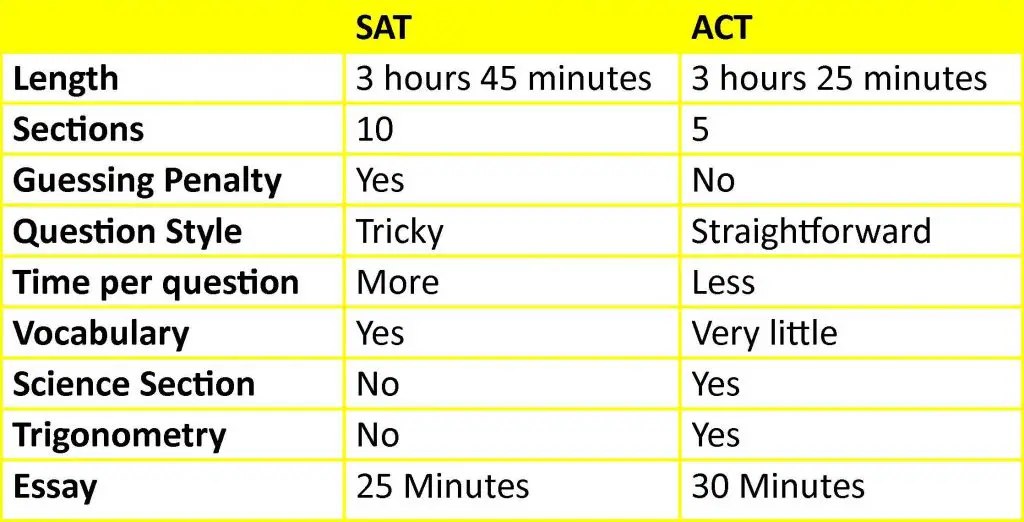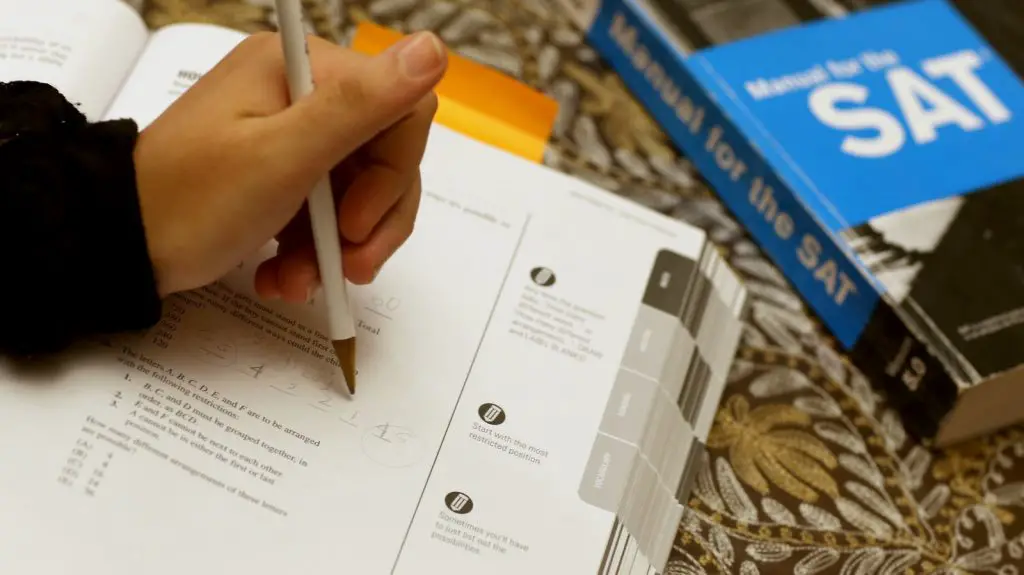Most high school students would be familiar with the ACT and SAT tests. These are college admission exams that test a student’s readiness for college-level courses. There are many differences between the ACT and SAT, so let`s take a look!
ACT versus SAT: key differences
The biggest difference between the ACT and SAT is time. The ACT has a time limit of 3 hours and 25 minutes, while the SAT has a time limit of 3 hours and 45 minutes. This means that students who take the ACT will have more time to answer each question.
Another major difference is content. The ACT covers 4 main subject areas: English, Math, Reading, and Science. The SAT covers only 2 main subject areas: Math and Evidence-Based Reading & Writing. This means that the ACT covers more ground than the SAT.
Finally, the scoring systems for the two tests are different. The ACT uses a point system out of 36 points, while the SAT uses a point system out of 1600 points. Both tests are designed to show how well a student does in comparison to other students, but the ACT’s point system is more detailed.
What is the total number of SAT and ACT questions? This will be another consideration if one of them is simpler. If you have a lot of time pressure, the SAT is generally a better fit for you since it has only 140 questions, whereas the ACT has 215.

Is the SAT easier or harder than the ACT?
However, the toughest test is not always the one that you think it is; in fact, many students do much better on one than they do on the other. The best way to find out is to take a practice test for each and see which one you feel most comfortable with.
Some students do better on the ACT because it covers more familiar material, such as grammar and science. Others find the SAT to be easier because it is structured in a way that is easier to understand. There is no easy answer as to whether the SAT or ACT is harder. It all depends on the student’s individual strengths and weaknesses.
The bottom line is that there is no definitive answer as to whether the ACT or SAT is harder. It all comes down to personal preference and learning style. Whichever test you feel more comfortable with is probably the best choice for you.
When should you take the ACT and SAT exams?
Now is the time to figure out when to take the tests after determining which one is best for you. The ideal moment to take the ACT and SAT is during your junior year since it gives you more opportunities to look for colleges or scholarships that are a good fit for you.
You should also consider how much time you need to prepare for the test. If you want to take the ACT, you should sign up for a practice test and start studying 3-4 months in advance. For the SAT, you should start studying 4-5 months in advance.
What are the dates for the SAT and ACT exams?
- SAT – March or April, May, June, August, October, November, December.
- ACT – February, April, June, July, September, October, December.
Even if you’re not sure which colleges you want to apply to yet, it’s a good idea to start studying for the ACT or SAT now. That way, you’ll be prepared no matter what. Moreover, keep in view the fact that applying deadline for both exams also varies.
- SAT – 4 weeks before the test date.
- ACT – 5-6 weeks before the test date.
So, which test should you take?
The answer depends on a few factors. First, consider which colleges you want to apply to. Some colleges only accept the SAT, while others only accept the ACT. Make sure you check with your desired colleges to see which test they prefer.

Next, think about what kind of learner you are. If you learn better under pressure and perform well under time constraints, then the SAT might be a better fit for you. On the other hand, if you like having more time to process information and don’t mind longer tests, then the ACT could be a better option.
ACT and SAT scores are both used in college admissions and the allocation of merit-based scholarships. The majority of institutions do not prefer one test over the other. The SAT and ACT are not significantly harder than each other. Students tend to perform better on one test versus the other.
Is it possible to take both exams?
Some students choose to take both the ACT and SAT to hedge their bets, but this is not necessary. Colleges will accept either score, so you don’t need to take both tests. In fact, taking both tests can be costly and time-consuming. If you’re trying to decide between the two, it’s best to focus your energies on studying for the one that you’re most likely to do well on.
If you want to apply to a few colleges in different regions or simply don’t know which one you want to apply for, it’s better to do both. Because they convert the scores into a common format, remember to verify their equivalency table, including for the new SAT or ACT.
What colleges prefer SAT or ACT?
The misconception that elite institutions prefer the SAT over the ACT is widespread. All colleges and universities that demand standardized testing accept both the ACT and SAT, according to popular belief. College admissions officers have also said they do not favor one test over the other.
Still, some students might feel more comfortable taking the SAT because it is considered to be “more academic.” The ACT, on the other hand, is seen as being more geared towards career and technical education.
In the end, it is up to the student to decide which test they want to take. Both the SAT and ACT are accepted by all colleges and universities in the United States. There is no need to take both tests unless you are unsure of which one you want to take.
Do Ivy Leagues prefer ACT or SAT?
Regardless of what you may have been led to believe, Ivy League institutions do not favor one test over the other. You can submit scores from either or both tests without fear of having your application penalized. Ultimately, it is a question of personal taste to choose between the SAT and the ACT.
There are some small differences between the two exams, but they are not enough to make a significant difference in your score. Instead, focus on studying for the test that you feel more comfortable with. Whichever test you choose, make sure to study hard and give it your best effort.
How to prepare for SAT or ACT?
Do your research and figure out which test is right for you. Consider your strengths and weaknesses. If you’re not sure which test to take, consider taking a practice exam for both the SAT and ACT. Once you’ve decided which test to take, focus on preparing for that test.

The SAT is a reasoning test that focuses on critical thinking skills. The test is comprised of three sections: Reading, Writing and Language, and Math. Each section contains multiple-choice and essay questions. The SAT is offered seven times a year, typically in October, November, December, January, March, May, and June.
The ACT is an achievement test that focuses on what you have learned in school. The test is comprised of four sections: English, Math, Reading, and Science. Each section contains multiple-choice questions. The ACT is offered six times a year, typically in September, October, December, February, April, and June.
In order to prepare for either test, it is important to first understand the format of the test. Once you know what to expect, you can begin practicing with sample questions. There are many resources available online and in print that can help you prepare for the SAT or ACT.
The best way to prepare for either exam is to take practice tests under timed conditions. This will help you get used to the pace of the test and identify any areas in which you need improvement. Additionally, be sure to review the content covered on each test so that you are familiar with the material.
Taking practice tests and reviewing content are both important parts of preparing for either exam, but they are not the only things you should do. It is also important to make sure you are getting enough rest and eating a healthy diet. This will help you to feel your best on test day.
Tuition or your own preparations?
When it`s time to decide whether to take the ACT or SAT, a lot of factors come into play: what colleges you want to apply to, your academic strengths and weaknesses, which test is offered when and where, and how much money and time you’re willing to spend prepping.
The most important factor in choosing whether to take the ACT or SAT is which test will give you the best chance of getting into the colleges you want to apply to. If your dream school doesn’t have a preference between the two tests, then you can base your decision on other factors, like which test covers the material you’re already stronger in or which test format you feel more comfortable with.
When preparing at home, you can use different apps available on AppStore or Play Market that allows concentrate on your problem areas, or you can take a prep course. For example, you can download Varsity Tutors’ free ACT/SAT app, which offers diagnostic quizzes, a customizable Quiz Lab, and more than 2,000 practice questions. Also, you can try additional apps that keep you concentrated on certain material, or you can use online video lessons to better understand test content.
You have to decide what works best for you and your budget. If you have the time and money to invest in a prep course, great! But if you’re short on cash or time (or both), there are plenty of ways to prepare at home using free or low-cost resources. No matter how you choose to prepare, make sure you give yourself enough time to get comfortable with the material and the format of the test.
Conclusion
ACT vs SAT is a common debate among students who are preparing to take standardized tests. There is no clear answer as to which test is better. It depends on each individual student’s strengths and weaknesses. Some students may perform better on the SAT, while others may do better on the ACT. The best way to determine which test is right for you is to take practice tests for both exams and see which one you perform better on. Whichever test you decide to take, be sure to give yourself plenty of time to prepare so that you can do your best on test day.
